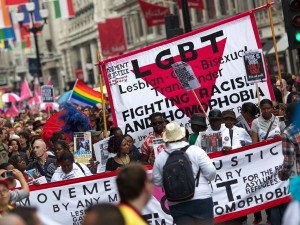
Members of the Gay and Lesbian community parade through London to celebrate the World Pride Festival on July 7, 2012. AFP/ANDREW COWIE
LONDON — London hosted a subdued World Pride parade on Saturday after organizers of the gay rights event said they had scaled it back due to funding shortages.
There were no floats or vehicles at this year’s celebrations in the British capital and no street events planned in the Soho district, where most of the city’s gay bars are concentrated.
The procession, which culminated in Trafalgar Square, also ended earlier than usual, at 6:00 p.m. (1700 GMT), organizers said.
London Pride issued an apology on its website earlier this week, saying it “deeply regrets the situation”, but said the changes were necessary in the interests of safety.
The charity blamed increased costs and the tough economic climate for the funding shortfall.
London Pride’s chairman Patrick Williams resigned on Wednesday following criticism of the board’s handling of this year’s event.
But the group urged people to join its celebrations regardless, adding that Britain’s gay community had “never been one to flounder in the face of adversity”.
Organizers said around 25,000 people took part in the march, while crowds also filled Trafalgar Square for performances by acts including Boy George.
The British government showed its support for the event in its 40th year, by hoisting the rainbow flag symbolising gay pride over one of its ministries for the first time on Friday.
Prime Minister David Cameron also sent a message of support Saturday, wishing those involved a “happy Pride”.
“It is 40 years since people first marched in London calling for equal rights,” he said.
“Since then we’ve come a very long way and progress is still being made.”
Ministers have pledged to legalise gay marriage in England and Wales by 2015, despite opposition from some Conservative lawmakers and religious figures.
Homosexual couples in Britain have been able to obtain civil partnerships, giving them legal rights similar to heterosexual married couples, since 2004.
British gay rights groups used Saturday’s event to call on other nations to decriminalise homosexuality.
“Nearly 80 countries still criminalise homosexuality, with penalties ranging from a few years imprisonment to life imprisonment and even execution,” said veteran campaigner Peter Tatchell.
Tatchell helped organize Britain’s first Gay Pride parade in July 1972 and runs a gay rights foundation.
Revellers wore crowns, carnival outfits, chains, masks and leather kilts, and waved placards reading “proud to be trans”, “glad to be gay” and “decriminalise homosexuality worldwide”.
Gay members of the armed forces marched, while others carried banners reading “fighting racism and homophobia” and “veterans of 1972”.